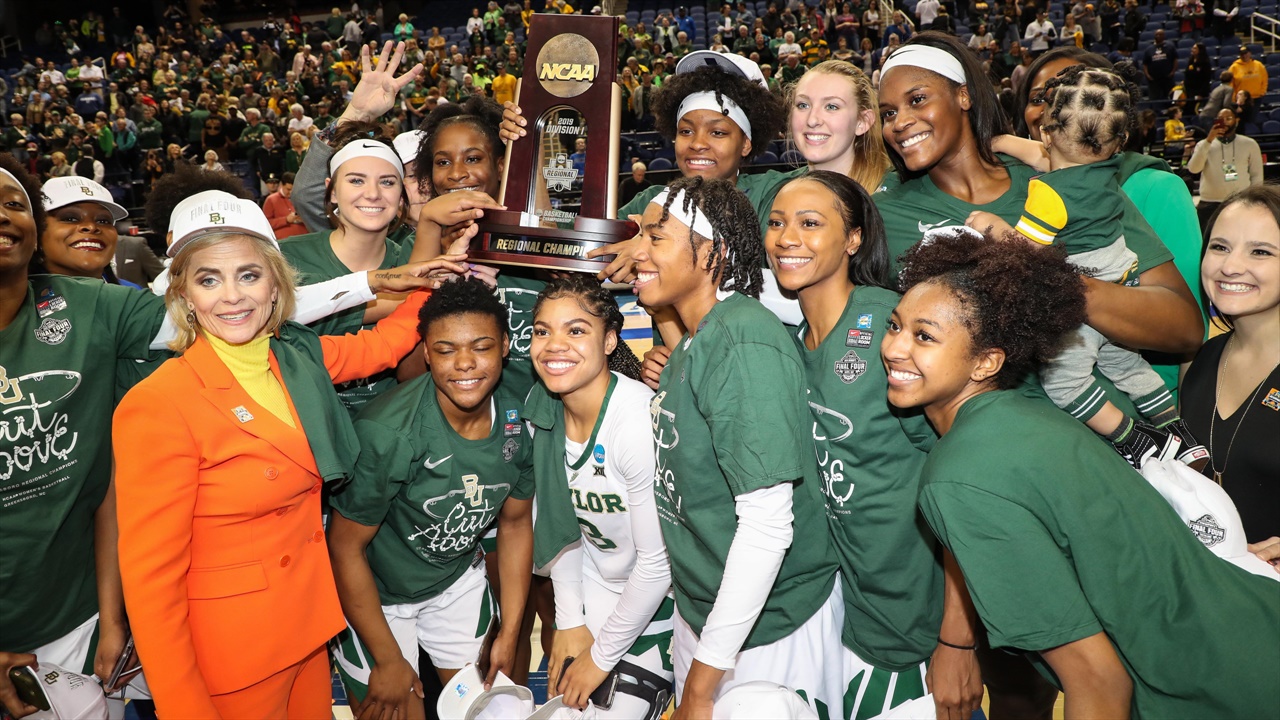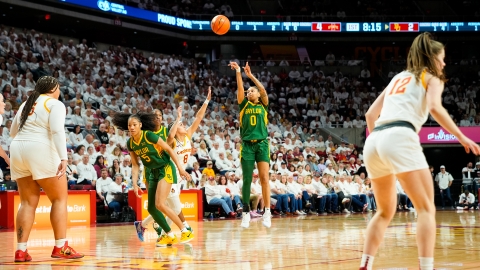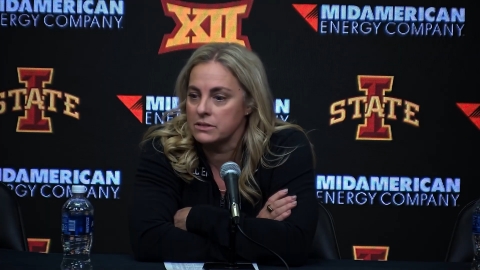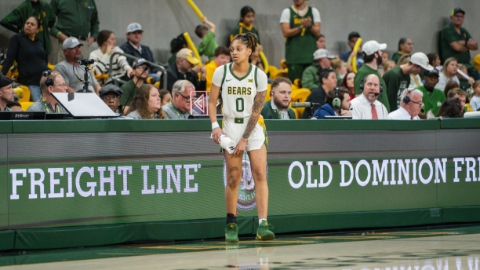
THE MODERATOR: Questions for the student-athletes, please.
Q. Kalani, what does it mean to actually be here at the Final Four?
KALANI BROWN: I'm happy. I couldn't be happier. I'm just excited to be here.
Q. Lauren and Kalani, when you look at the contrasting styles of play, what you like to do, what Oregon likes to do, almost feels like old school versus new school basketball. How would you describe the matchup between you guys?
LAUREN COX: We're more of an inside-out kind of team. We have two big post players inside. They're more of a, like, 41 team, one player inside, four at one end.
KALANI BROWN: I mean, she pretty much covered it.
Just what she said. A 41 team. We use more a post game. Our game is pretty much ran through our post.
Q. Chloe, I can remember talking to you earlier this year, how excited you were about everything that's happened this season. I know you still have a lot you want to accomplish. Can you put in perspective what this journey has been like for you coming here and everything that you've done here?
CHLOE JACKSON: I would say it's been a dream come true, just like I couldn't have written a better story, honestly. Came here, wanted to win, to get to a Final Four. We achieved that. We won the Big 12, got to a Final Four.
We're not content. Just want to keep pushing, stay focused to win a championship.
Q. Coach has been here many times. What type of advice have the coaches given you, enjoy yourself, enjoy the moment, but also it's a business trip, as well?
LAUREN COX: She's just trying to keep us focused. Our motto this year is: together to Tampa. She said we can't be content with just getting here. We have to stay focused and want to make it all the way.
Q. Lauren, with the 41, playing what they have, does that make you have to get out, stretch out? How much does it help that you already played that kind of team before?
LAUREN COX: Yeah, I'm going to have to go out and guard on the perimeter some, guard the three-point shot. I've been doing that all year. That definitely helps to have that experience.
THE MODERATOR: We'll let the ladies go. Thank you.
We'll take questions from Coach Mulkey.
Q. Would you agree with the maybe characterizations, this could be looked at as old school versus new school basketball?
KIM MULKEY: No. You play your personnel. I'm 6'7" and 6'4", bring them outside, tell Kalani you go outside and start shooting threes.
You change, you adapt to whatever your personnel is doing. I have two freshmen posts that are more athletic. You don't see us run the same stuff when they go in the game. I guess you could call me old, if you want to. You can call me old-fashioned. I'm good with all of it. I just play to win.
Q. What do you remember about the first Final Four? How was it compared to now?
KIM MULKEY: I think that first banner you see out there was 1982, and I was a part of that team. I don't remember a whole lot about a lot of things, but was it Cheyney State, Vivian Stringer. Older than me (laughter).
Deborah Wideman, that name familiar to you? Her brother is Dennis Rodman. She and I came off the bench, we were co-MVPs. I always had assists at the other end to Rodman and Lawrence. That's what I remember, is who we played, what they did to us, and how effective I was in breaking the press.
Q. There's been so much attention on your two bigs in the past couple games. How important is Chloe Jackson to this team? Obviously with switching her position earlier this year, what was the biggest adjustment or the adjustment she had to spend most time working on?
KIM MULKEY: We're in the Final Four. We don't have a true point guard. Imagine starting your season anticipating that you're going to have this great point guard, anticipate you got to get rid of your quarterback in football, you have to take a wide receiver, put them at quarterback. That's what we had to do.
I just think that experience that she had has helped her. She doesn't get too high, she doesn't get too low. The thing I had to do was work extra hard. I didn't anticipate that. When I say that, it's every day. I had to teach her everything about our defense, everything about offense. She's responsible for everybody on that floor. Her personality is not where she's a big talker, so I had to teach her to open her mouth, communicate. Had to do it quickly. That kid, what she has done, is amazing.
The thing I didn't want to do is take away her scoring ability. She -- in my opinion, she's one of the best midrange shooters that I've ever coached. I would have to think in the country. When Chloe misses a shot, you're surprised. She keeps shooting, and she hits those big shots in the clutch for you.
Yes, we certainly are known for our bigs throughout probably my coaching career at Baylor, but we also have some pretty good darn good perimeter players. We had some outstanding role players. Then you take the Fab Five freshmen that sit over there, the No. 1 recruiting class in the country. When you mix all that together, they're happy, they like each other, that's a blessing this day and time.
Q. Kim, can you talk a little bit about your journey over the last few years, what it means getting back to a Final Four. UConn is here every year, Notre Dame has been here a lot. For you, the journey to get a team back here, what it means to you.
KIM MULKEY: '05 when we won the first national championship, it was the first time Baylor had been to a Final Four. I sat at that press conference and said, Enjoy it, I don't know if we'll ever be back. It's just so hard.
We knew we were creating a monster and we had to keep feeding that monster. What you try to do is try to remain relevant, you try to continue to recruit. That championship opened doors for us in recruiting. We came back in '12, excuse me, '10, we went to San Antonio, lost to UConn in the semifinals. Came back again in '12, went 40-0. We lost some really heartbreaking tournament games. But I walked off that floor realizing that that team just played unbelievable. It wasn't like we gave it away. Wasn't like we played bad. It just happens. That's why they call it March Madness.
You just keep plugging away, you keep working. We're here again.
I don't look at it like, Oh, my gosh, it's been seven years. I look at it like, Baylor is still an elite program, they're in their fourth Final Four. Coaches coach a lifetime and never make it. I just don't tend to put a timeframe on it. I just want to always be one of the teams talked about that has a chance to be there every year. I think we always have been that type of program.
Q. Some of your Oregon ties. What do you remember about winning the championship in Eugene back in the day before it was the NCAA tournament? Also, facing Oregon in 2005 on the way to the Final Four, what do you remember about that as well?
KIM MULKEY: Well, Coach Barmore probably won't want you to tell you all this. I think Michelle did a story about the way you used to coach and the way you have to coach now.
Let's go back to Eugene when I was playing. I think it was USC. Who did we beat in the semifinal? Or was it Tennessee?
Q. USC, then Tennessee.
KIM MULKEY: Okay.
I say this, so don't make him out to be a bad gay, but this is the kind of coach he was. What was the score? The semifinal? It was pretty convincing. We won 16 points. We're excited. We get in that locker room, and they had trash cans. I'm telling you, he let those trash cans fly. We just sat there. We're getting ready to play for a national championship and you're throwing trash cans.
But we loved it. He knew we were that close to a national championship, and it was just the intensity of the moment. What's wrong with that? Right? He got our attention. Here I am 56 years old and I remember the moment. We can laugh about it, talk about how wonderful it was. But he got us ready for that championship game.
Then we go out and win a national championship. I remember people saying, Getting mean in Eugene, whatever that meant.
Then the second time, we played Baylor to win the first national championship in '05. Things I remember, Chelsea Whitaker had to go get IVs. She just sweat a lot. Her body would just cramp. That's your starting point guard that we're having to nourish back to health to win a couple games there.
Bales was your coach, right? Those are things I remember. I can't tell you specifics of the game, but the excitement of '05 for our school and our program started out there, and it just continued onto the RCA Dome in Indianapolis, which is no longer there.
Q. Geno said of Notre Dame, I think we're playing the best team in the country. Is that wheelhouse for you?
KIM MULKEY: No. Look, timing is everything in life. Timing is everything. We just kept winning, everybody else would lose a conference game or conference tournament game. So we were the fortunate ones to be selected as the overall No. 1 seed. It really doesn't motivate me. It doesn't offend me.
Q. From afar, everyone talks about Muffet and Geno. As a competitor yourself, can you understand where competition, striving to be the best, creates animosity?
KIM MULKEY: Sure. Listen, we would all be best friends if we weren't coaching. Hell, some of us may be married to each other if we weren't coaching, right? You have the same interests, you know. But when you're coaching your respective universities, it's not like you're kissing your sister and loving on them every day.
Usually type A personality coaches butt heads from what we do for a living. You know, it's the nature of the successful coaches, not just in women's basketball. You can go to pro football. You know, it may come across as personal sometimes, but honestly if we weren't doing what we're doing, we'd all be best friends. I really believe that.
Q. (No microphone.) On if they would be friends if they were not competing against each other...
KIM MULKEY: Probably. Probably. Because we would have no reason to not like each other. We would talk sports. Some would go sit around, drink beer together. I'm not a drinker, so that would bore the heck out of me. I'd drink a lot of Cokes with them. I just wouldn't see why you wouldn't get along if you weren't competitors.
Q. You talked about the five freshmen. When you're recruiting a class like that, how much, with today's age with transfers, how much do you talk about playing time coming in? How big have they been with this team?
KIM MULKEY: I don't talk playing time. I talk about the position I'm recruiting you to play. I talk to them about a personality. I talk to them about how tough their freshman year will be at any major university. Then I let them ask any questions they want to ask about me. There is nothing off limits with me. That's the truth.
You would be amazed at some of the questions I get asked. Can't guarantee playing time. Can't guarantee championships. Can't guarantee that you're going to get drafted. That's out of my control. But what I do guarantee those families is that I will get your daughter home with a college degree. I don't know how long it will take, but she will leave Baylor. The only reason you wouldn't get a college degree from Baylor is if you walk away from it, or if I have to dismiss you from the team, or you transfer. That's about the only thing I tell them. My gift back to you and your family is that college degree.
Obviously I think you're good enough to play for me or I wouldn't be recruiting you. But you can't talk playing time with people. That's where you get in trouble.
Q. (No microphone.) On the five freshman...
KIM MULKEY: Those five freshmen, unbelievable. If you haven't seen it, I hope they post it. Queen Egbo was just dunking the ball in practice. Aquira DeCosta was tipping in dunks and I'm sitting there with my mouth wide open. Where has that been all year? Those kids came to Baylor to experience this, to win Big 12 championships. They knew what was in front of them. Their unselfishness of watching them work every day, beat each other in practice, cheer each other on in the game, it's a lost form of team chemistry right now with all the transfer stuff you have going on because it's all about the welfare of the student-athlete this day and time.
To have 12 of them on the team that pull for each other, you don't have to sit there and worry about playing time, all that stuff, man, that makes it fun.
Q. I know Lauren has been Big 12 Defensive Player of the Year last two years. She's one of the best post defenders in college. Talk about her evolution. She came in good, but seems like she's really expanded how good of a defensive player she is.
KIM MULKEY: Michelle, you're right, but I'm going to go one further than that. I think she's one of the best defenders at any position. She can defend any position on the floor if I asked her to.
That's what separates her from other people who think their kid is the best defensive player in the country. You may be, down the block as a post player, but can you go out there and guard a three player, guard the point guard if I get in trouble with my point guard defender.
That kid can play any position on the court. She can defend any position on the court. She alters shots. She has a coach's mentality and understands and can see things happen before they happen. She'll put herself in a position to be a great help defender, help a teammate. She will communicate with a teammate. She understands the game probably as good as any player that I have ever coached.
Q. The assist-to-turnover ratio, is that something that's been better than average this year for you guys? Why has it been that way?
KIM MULKEY: I think you start with Chloe Jackson and her unselfishness. Chloe can score the ball and does score for us. Chloe has a knack to get everybody else involved. We preach it all the time, that I'm going to take you out of the game if you turn the ball over and you don't play defense. I'm going to put you back in at some point, but if you don't take them out, how do you ever fix that? How do you ever correct it? Tell them in a timeout to quit turning the ball over? That goes in one ear and out the other. But if you put them on the bench, they'll remember it.
It's not something that you overemphasize with this team at the beginning of the year. Like I said, we don't have a true point guard. I didn't know if we were going to be a team that threw it all over the gym, we were going to be wild. Quickly I learned Chloe doesn't play like that. Then DiDi and Juicy can relieve her when she needs a breather or when she's trapped and they throw it to one the wing players. They can bring the ball up the floor for us. Then you have to know that all they do is throw the ball inside. How difficult is it to get the ball to a 6'7" kid and a 6'5" kid? So that helps as well.
Q. I'm curious about the number 7. I don't know if you've given much thought to it, but you won in '05, '12, this is '19. Have you given much thought to that?
KIM MULKEY: No, I haven't. But if you say so, I believe ya, okay? I don't give much thought to it. But, yeah, that is kind of unique, isn't it? I don't know.
Q. Can you talk about Oregon's offensive threat.
KIM MULKEY: I won't tell you my plan, is that fair enough? I will tell you that it all starts with Sabrina. What a talent. What a joy to watch. If you're not having to play against her...
The thing that I love more than her talent is I love the way she competes. She's go that umph in her. She makes everybody around her better. She's just a special, special talent.
That's where I start and probably stop in answering your question. All those kids know she makes them better. She'll get the ball to them in spots where it makes them look good. She certainly is not the only great player on that team but it starts and stops with her.
Q. Can you describe DiDi's impact during the tournament, on both ends of the court, her personality, what she brings to the team?
KIM MULKEY: We'll start with her personality. She is the light in our locker room, on the floor. She keeps everything light, but yet serious because of how she plays. She plays so hard. She's just got personality plus.
You talk about her basketball on the floor, she and Lauren Cox are our defensive stoppers. We go as those kids go on the defensive end. Now, a lot of people want to talk about her being an offensive liability. If you saw the last three or four games, I don't think you'd say that any more. She has a knack for cutting to the basket, getting offensive boards, a knack for leaking out in transition. Our posts have played with her so much now that they know they can find her.
She is just pleasant, vocal, prissy, girly. That's DiDi.
Q. After you guys knocked off Iowa, you were passionate about making it here for your seniors, for your players. What did it mean being here for the university?
KIM MULKEY: Well, it's a positive. Back in 2005, we went through a lot at our university the previous year. We were the shining light of Baylor University, if you will remember. That was the big theme, is that women's basketball quickly erased a lot of the negative. We certainly have been through some negatives here the last couple of years. I'd have to think this is a positive that will help a lot of people heal.
Q. DiDi said in the locker room that she didn't see herself as a defensive stopper when she first came to Baylor. The one way she knew she would get on the floor is to be that defensive stopper. What has her evolution been since she first stepped on campus to the role?
KIM MULKEY: When you sit in a recruit's home, they don't really talk about that. Reality doesn't hit them until they get to their first week of practice. Then you separate the pretenders from the contenders. Who is really going to be the one that contends, really, really buys into that defensive stopper.
DiDi had the length on the perimeter. She had the quickness. She had the personality to do it. She just, from day one, got my attention. Now, she was inexperienced as a freshman. She had her lunch handed to her by upperclassmen we would face. She has evolved into, I'm going to figure this out. Her activity and effort was always good, but it was just footwork, principles, running into screens. Listens to a scout report really, really well.
Now what she's so confident at doing is kind of like Lauren Cox. It's not just me, I have to help everybody on the floor. I have to know when to go help. I have to do some things instinctively on the floor that coach didn't tell me to do. She does a lot of that for us now because she's comfortable.
Q. You're the only coach here who has played in and won a national championship. How do you think that shapes the advice you do give your players?
KIM MULKEY: Well, I don't know that there's any advantage. I think the way I coach, I am able to do and say things that maybe a lot of coaches aren't comfortable saying and doing, because I coach with passion, I coach with a great level of intensity. I'm not so smart that I'm never wrong. I tell them when I'm wrong in the locker room.
Kids feel that. Kids know. So they allow me to really push them beyond limits that they think they're even having, but they know it's not to harm them in any way. When you feel that from a coach, they'll run through that wall for you. I was coached by the greats, Leon, Pat Summitt. Certainly I don't do some of the things that they did back in the day, but I incorporate that passion and intensity into my own funny, quick-witted personality. You wouldn't believe some of the things I say to those kids, and they just roll their eyes. I hope that I never, ever have to deal with some of the things coaches are dealing with because they just know Kim is real, she's real, says things people are afraid to say. She means no harm, doesn't want to offend anybody. She just wanting those kids to have the most wonderful experience in basketball and leave Baylor with a college degree.
THE MODERATOR: Thank you, coach.
KIM MULKEY: Thank you y'all.



